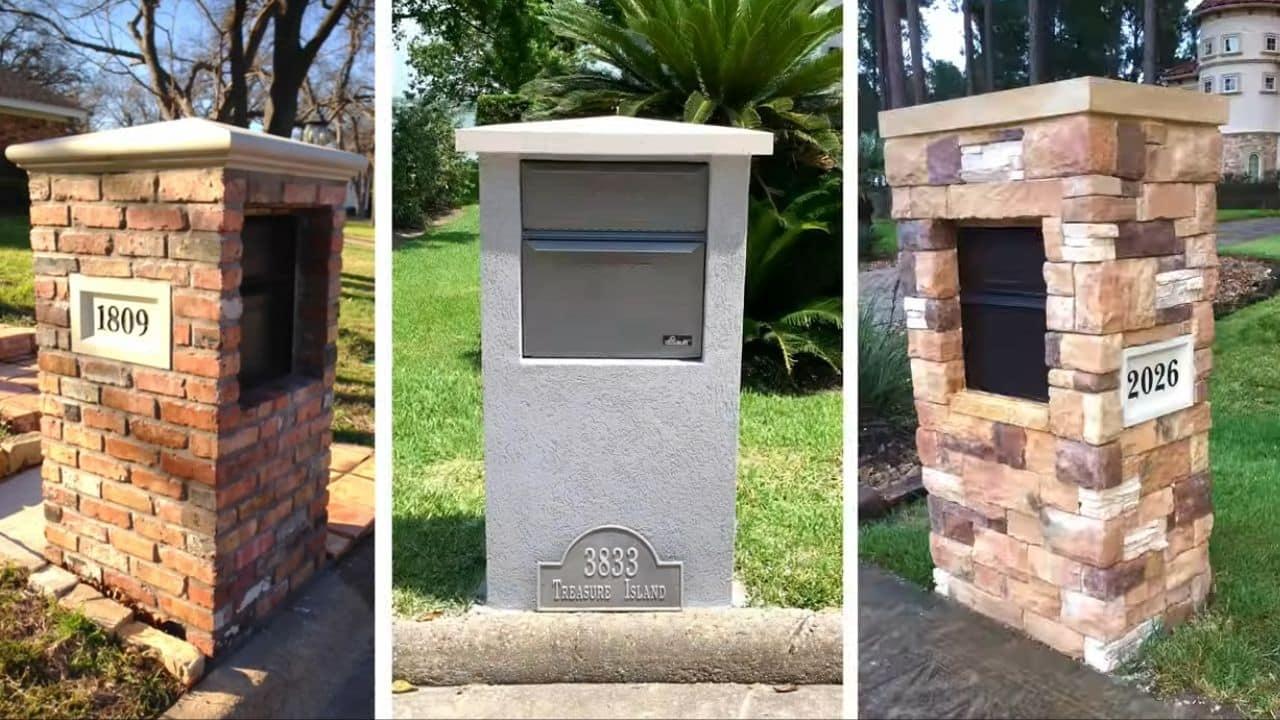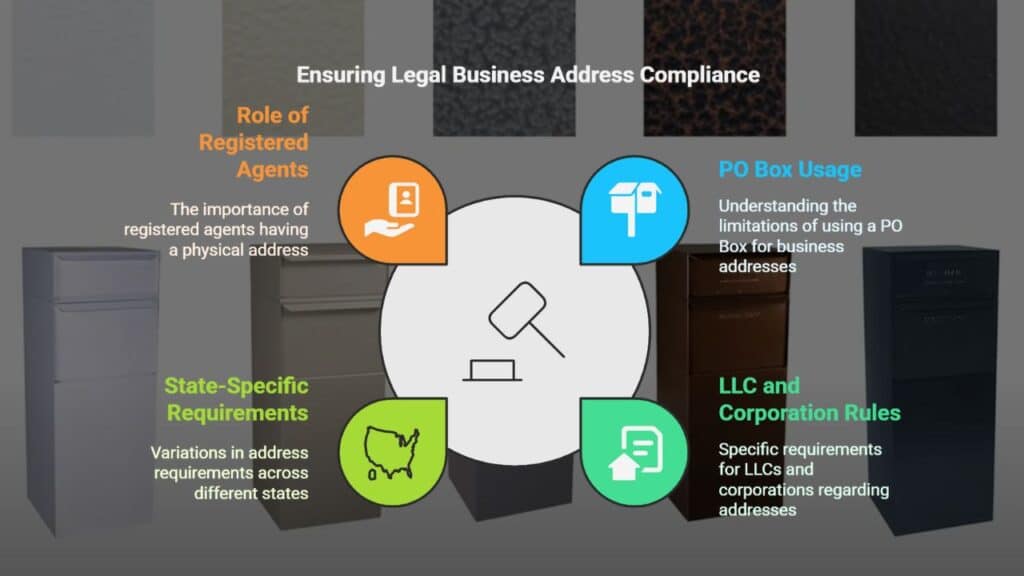Choosing a business address is important, but you might wonder if a PO Box works. Most states do not allow PO Boxes for business registration. They require an actual physical location.
But, there are alternatives to keep your mail safe and make your business look professional.
For legal reasons, businesses need an address where someone can physically enter. This rule helps with transparency and compliance. If you’re looking for other options besides a PO Box, consider solutions like virtual mailboxes or commercial mail receiving agencies.
These services provide a street address that meets state requirements for business paperwork.
So, while using just a PO Box as your official business address won’t work in most cases, there are easy ways to meet the rules and protect your privacy. Look into these alternatives to find one that suits your needs best.
Key Takeaways
- Most states require a physical address for business registration, not a PO Box.
- Virtual boxes give street addresses that meet state requirements.
- A PO Box protects your privacy but may seem less professional.
- Check the Secretary of State’s website for PO Box usage rules in your state.
- Use virtual mailboxes, coworking spaces, or registered agent services to comply with laws and maintain privacy.
Can a PO Box Be Used as a Legal Business Address?
A PO Box can manage business mail, but the rules differ for LLCs and their locations.
Rules for LLCs and Corporations
LLCs and corporations must have a physical address in the state where they register. They also need a registered agent with a real address, not just a PO box. This ensures there is a known location for the business.
Using only post office boxes does not meet legal requirements. Each company requires an individual to manage official documents in person for legal compliance. State-specific rules apply too.
State-Specific Requirements
Different states have their own rules for business addresses and mail. This matters if your business is mobile or in multiple locations:
- Massachusetts and South Carolina require a business address within the state. An out-of-state PO Box won’t work as your primary address.
- California and Texas allow businesses to use out-of-state addresses, so an out-of-state PO Box works fine here.
- The Secretary of State website for each state provides up-to-date requirements for a legal business address.
- States often need a physical address for sending legal documents, especially important for LLCs and corporations.
- If your state requires a registered agent, their address usually must be a physical location in that state.
Understanding these rules helps ensure your business stays compliant with laws and receives essential mail correctly.
Benefits of Using a PO Box for Your Business
A PO Box offers business mail security, keeping your home address private and ensuring safe delivery.
Privacy and Security
Using your home address for business lets everyone know where you live. This can lead to safety issues and unwanted visitors. A PO box increases privacy by keeping your actual address hidden.
For businesses, this security means protecting important documents and products from being lost or seen by the wrong people.
Reliable Mail Delivery
P.O. Boxes give businesses 24-hour access to their mail. Owners get alerts for package arrivals. This avoids missed deliveries or mail theft.
Using a P.O. Box means no lost mail worries. It’s a cost-effective option for small businesses, keeping mail secure until collection.
Affordable Option for Small Businesses
PO Boxes offer small businesses a low-cost solution for handling mail, starting at $6.33 a month. This choice helps maintain privacy affordably. In large cities, demand can lead to wait times for new boxes.
Small companies can avoid the high cost of renting office space by choosing PO Boxes. They meet the needs of those on tight budgets and with basic requirements.
Limitations of Using a PO Box for a Business Address
Using a PO Box for your business offers privacy and is easy, but it can lead to legal issues and may make your company seem less established.
Legal Compliance Issues
A PO Box as your business address can clash with state regulations. States require a physical address for businesses. The Secretary of State must have your actual location on file.
When relocating or changing addresses, promptly update the Secretary of State to avoid legal issues.
Some businesses, like LLCs and corporations, often overlook this requirement and face problems later. Keeping information current with the state office is crucial to avoid damaging your business reputation and incurring fines.
Lack of Physical Presence
Not having a physical address for your business impacts credibility. People value seeing where you operate. It assures them of your legitimacy. For LLCs, a physical location is essential for receiving legal documents.
Being visible in the community you serve strengthens trust and connection.
Without an office or shop, proving reliability becomes challenging. Customers prefer businesses with easily identifiable locations. This boosts confidence in your services and ties you closer to local customers.
Restrictions on Registered Agent Use
Businesses without a physical location face challenges. One key issue is handling legal papers. Your registered agent cannot use a P.O. box because they must be present to receive important mail during normal work hours.
Legal notices and tax information require in-person delivery, not just being dropped in a box.
P.O. boxes are not allowed for registered agents due to the need for physical document acceptance. Critical moments often demand face-to-face interaction. For serious matters like lawsuits or government notices, having someone available to physically accept documents is essential.
Alternatives to a PO Box for Business Addresses
Looking for a different way to list your company’s address? A virtual mailbox, shared workspaces, mail agencies, and registered agent services offer fresh options. Keep reading to find out how these can fit your business needs!
Virtual Business Address or Mailbox
A virtual business address gives your company a real street address without the cost of office space. Prices range from $10 to $65 monthly, depending on services. This keeps your home address private and boosts your business image.
With a virtual mailbox, you can manage mail online from anywhere, using a computer or mobile app. This is useful for small businesses needing a cost-effective mail solution.
Coworking Spaces
Coworking spaces offer small businesses a professional mailing address and mail handling. They also provide work areas for collaboration. This setup maintains privacy while enhancing business image, which is something a PO box or home address cannot do.
Coworking spots allow businesses to connect with others without forcing them into a long lease. An actual physical address makes it easier for customers to find the business.
Commercial Mail Receiving Agencies (CMRAs)
Commercial Mail Receiving Agencies, or CMRAs, offer a real street address in locations such as mail centers or office buildings. This is useful for those who need more than a P.O. box.
To use a CMRA, you must fill out USPS Form 1583. This process allows you to have a street address that enhances your business image and reputation over using just a P.O. box number.
It enables professional mail handling without the high cost or worry about missing parcels and letters.
Registered Agent Services
A registered agent receives legal mail for your business. Every company must have one by law. This agent needs a physical address in the state of your business registration. This ensures you meet secretary of state requirements.
Using a registered agent keeps your business mail private and secure. Choosing a trustworthy service prevents missing important documents. It’s key to find the right service for your business address needs.
How to Choose the Right Business Address Option
Choosing a business address involves matching your company’s needs for privacy and image with legal requirements.
– Consider privacy, business reputation, and compliance with laws like those set by the Secretary of State.
– A physical address or virtual mailbox can help meet these needs while keeping personal information separate.
– Commercial mail receiving agencies offer solutions that balance a professional look with the need for private mail handling.
Evaluate Your Business Needs
Consider the type of business mail you handle. If it’s mostly physical documents, a PO box might work. But, if you rely on online banking, maybe not. Privacy is another factor. A home address could attract unwanted attention or break homeowner association rules.
Your business image matters too. A professional appearance may rule out using a PO box on business cards. State laws also play a role in where businesses can operate. Checking with the secretary of state can prevent problems later on.
Consider Privacy and Professionalism
Using your home address for business can compromise privacy and safety. Clients may view a business with a home address as less professional. A commercial mail receiving agency offers a more professional-sounding option than a P.O.
box or home address, separating personal and work matters effectively. This choice enhances both business reputation and privacy protection.
Research State and Legal Requirements
Every state sets its own rules for business addresses. Check the Secretary of State’s website in your area to understand these regulations. This step is crucial for LLCs and corporations.
Keep your information current; states require quick updates on any address changes.
Online tools like QuickBooks Online and Green Dot Bank help track business details, including addresses. They ensure compliance with state laws, helping avoid legal issues. Use these resources to manage your business registration and mail according to what your state mandates.
Can You Use a PO Box as a Billing Address for Your Business?
You can use a PO Box as your business’s billing address. This protects your home address and works for businesses without a permanent office. Clients send payments and documents to the post office box, so check it often to avoid missing important mail.
Many businesses prefer using a PO Box for safety and to keep mail organized. However, banks and government agencies may require a physical address too. Having both addresses ensures your business meets legal requirements and receives all its mail properly.
Takeaways
Thinking about getting a PO Box for your business? State laws vary – some allow it, others don’t. A PO Box can keep your home address private and manage mail overflow. Yet, for legal needs, explore other options like virtual mailboxes or coworking spaces.
These alternatives often fit business demands better. Always check state regulations to ensure compliance with business registration and privacy rules.
For more detailed information on using a PO Box as your business billing address, visit our comprehensive guide here.
FAQs
1. Can I use a PO Box as my business address?
Sure, you can use a PO Box for receiving your business mail. However, when it comes to official matters like business registration or compliance with the Secretary of State, particularly in the United States, they typically require a physical address.
2. What if I run my business from home and want to protect my privacy?
If you’re running a sole proprietorship or limited liability company from your home but wish to keep your home address private, consider using alternatives like a registered agent service or virtual mailbox. These services provide an official-looking business address while keeping your home sweet home off public records.
3. What are some implications of using my residential address for my business?
Using your home address could potentially ruffle feathers with homeowners’ associations or condominium covenants in certain areas. Plus, it might not paint the best professional image for clients who prefer doing business with companies that have dedicated office locations.
4. Does having a PO box affect how customers perceive my business?
Having just a P.O box might raise eyebrows among some customers who may question why there’s no physical location associated with the company name on their credit cards statement! A solid street presence often boosts credibility and trustworthiness in consumers’ eyes.
5. Are there any digital solutions available instead of traditional post office boxes?
Absolutely! Virtual mailbox services offer online access to all your mail through mobile apps on android phones or tablets – talk about convenience at its finest!
6. Is it expensive to get these alternative mailing addresses for businesses?
Pricing varies depending on providers and subscription services chosen by you but generally speaking; these options won’t break the bank compared to relocating an entire operation!




































